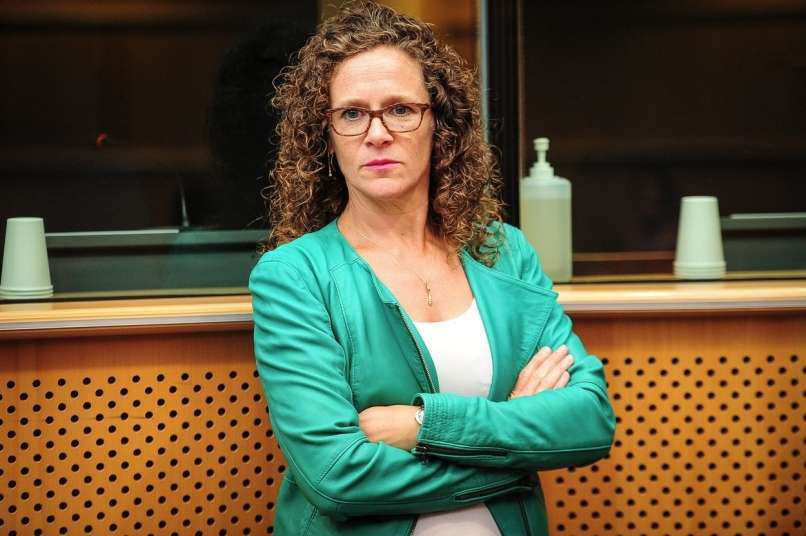The chairwoman of the European Parliament’s Democracy, Rule of Law and Fundamental Rights Monitoring Group, Sophie in ‘t Veld, is currently visiting Slovenia. She came here to get the “real picture” of what is happening in Slovenia, particularly in the field of the rule of law and the media – despite the fact that she already got the opportunity for insight into the state of the media in our country in April this year, with a video which you can watch below, and which she decided to censor instead of watching.
Prime Minister Janez Janša was also expected to meet with Sophie in ‘t Veld as part of the European Parliament delegation’s “assessment of the situation in the field of the rule of law, media freedom, and the fight against corruption,” but Janša decided to cancel the meeting, as in ‘t Veld is clearly not prepared to actually listen to both sides. She proved this with her actions at the meeting of the Committee on Civil Liberties, Justice and Home Affairs (LIBE), when she did not broadcast the video, which shows the real state of the media in Slovenia – despite promising to do so.
Namely, Janez Janša took part in the aforementioned meeting in April this year, at which the European Parliament’s Democracy, Rule of Law and Fundamental Rights Monitoring Group discussed media freedom and the rule of law in Slovenia. At the meeting in question, the group, which operates within the parliamentary Committee on Civil Liberties, Justice and Home Affairs, continued the discussion on media freedom and the rule of law in Slovenia, which began on the 5th of March 2021. At the beginning of the discussion, Janša pointed out that since 1987, he has personally been working hard to get the European Parliament to discuss the rule of law and freedom of the media and the state of democracy in Slovenia, “but at that time, that was not possible yet, as Slovenia was still part of Yugoslavia – but that was the time when we needed such help the most, and in a way, we also need this discussion now or throughout the time of transition, which is still not over.”
Janša then said that “it is no secret that we have problems with the rule of law and freedom of the media in Slovenia. Of course, we all look at these problems differently. What is the true objective criterion, however, are the facts.” He emphasised that government officials are willing to cooperate at any time, adding that he hoped the epidemic would end as soon as possible so that the debate could be conducted live and there would also be enough time for speeches and explanations without censorship.
The government is not hiding anything
“I regret the fact that we have received certain warnings in recent hours, in the sense that you have to personally approve what we are going to show in a video, which I do not think is a major contribution to respect for media freedom,” said the Prime Minister. “As for the position of the Slovenian government, unlike previous governments, we do not want to hide anything, we are willing to talk about anything that anyone might find problematic when it comes to the rule of law and freedom of the media in Slovenia, we just want enough time to present the other side, and of course, we also invite everyone who believes that there is anything wrong to come to Slovenia and get directly familiarised with the situation,” said the Prime Minister, adding that everyone from abroad would only need to stay here for about a week, get a good translator, and then monitor the media and political events in our country with the translator’s help, and it would quickly become completely clear to them what is actually happening in Slovenia.
Video on the state of the media in Slovenia
Prime Minister Janez Janša then suggested watching a video prepared in English, talking about attacks on journalists, proceedings conducted against journalists and the attempted murder of a journalist in Slovenia at a time when Slovenia was already independent, which is something we cannot be proud of. “Unfortunately, those who have their mouths full of media freedom do not see such problems as were experienced by Slovenian journalists, who were either beaten almost to death or fired when they were dying,” said Prime Minister Janez Janša.
As MEP Sophie in ‘t Veld refused to have the video broadcast despite prior agreement and coordination, the Prime Minister called on her to prove in practice that she was committed to media freedom and to broadcast the video. He also rejected allegations that there were technical problems, as the Parliament’s expert services confirmed that there were no such problems with the video. Janša’s appeal did not help. The MEP carried out her censorship.
Sophie in ‘t Veld was visibly nervous
The presiding Sophie in ‘t Veld was visibly nervous, and with her censorship, she prevented the European Parliament from being informed of the real situation in the country. In doing so, she made excuses about technical difficulties and time constraints, which were then proved to be pointless, as the group finished with the discussion half an hour before the scheduled end time. The real reason for the censorship, which Sophie in ‘t Veld also mentioned during her explanation, was that the video would remain in the archives of the European Parliament if it was to be played at the meeting. This would mean that it would be accessible to everyone, and so everyone would be able to learn about its content. After the chairwoman in ‘t Veld faked ignorance for a while, Janez Janša left the conference and switched off. What is interesting is that the group also did not manage to establish a video connection with the Minister of Culture Vasko Simoniti. Janez Janša responded to that by writing: “Apparently, you are also having problems with your microphones.”
Sara Kovač


